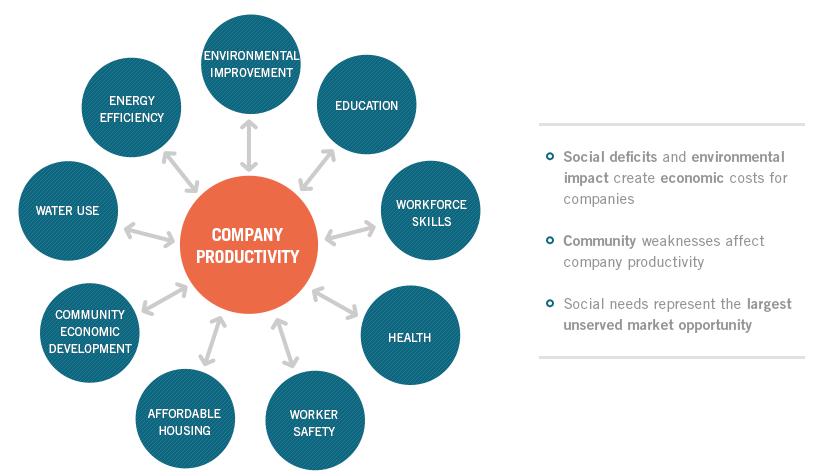Creating Shared Value Explained
Creating shared value is a framework for creating economic value while simultaneously addressing societal needs and challenges. When businesses act as businesses—not as charitable donors—they can improve profitability while also improving environmental performance, public health and nutrition, affordable housing and financial security, and other key measures of societal wellbeing. Only business can create economic prosperity by meeting needs and making a profit, creating infinitely scalable and self-sustaining solutions.
Key Concepts
CSV is not csr
Creating shared value goes beyond philanthropy or corporate social responsibility.csv = social value + economic value
Creating shared value is addressing societal needs and challenges with a business model.csv will drive innovation & growth
Creating shared value will drive the next wave of innovation and productivity in the global economy.The purpose of the corporation must be redefined as creating shared value, not just profit per se. This will drive the next wave of innovation and productivity growth in the global economy. It will also reshape capitalism and its relationship to society, and legitimize business again as a powerful force for positive change.
There are numerous ways in which addressing societal concerns can yield productivity benefits to a firm. Consider, for example, what happens when a firm invests in a wellness program. Society benefits because employee and their families become healthier, and the firm minimizes employee absences and lost productivity. The graphic depicts some areas where connections are strongest.
Social Needs & Economic Value Creation

How can companies create shared value opportunities?
Companies need to think differently about customers, products, and markets and put shared value at the core of their business.
The three levels of CSVThe new competitive advantage: Creating Shared Value
Some of today’s most successful companies are aligning their strategic positioning with shared value principles.
Adding a social dimension to strategyThe next evolution in capitalism
Shared value holds the key to unlocking the next wave of business innovation and growth. It will also reconnect company success and community success in ways that have been lost in an age of narrow management approaches, short-term thinking, and deepening divides among society’s institutions.
Redefining capitalismThe new roles and relationships for government and NGOs
The focus on social impact unites the goals of companies, NGOs, and government. Shared value fosters new relationships between companies, philanthropists, NGOs, and government in addressing social issues.
The new roles and relationships
